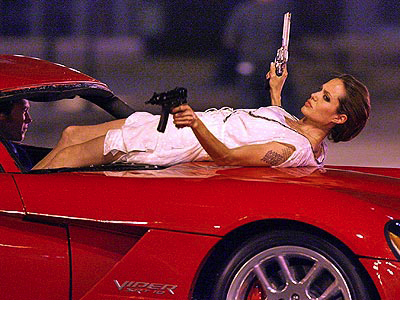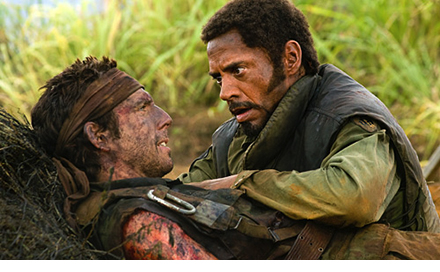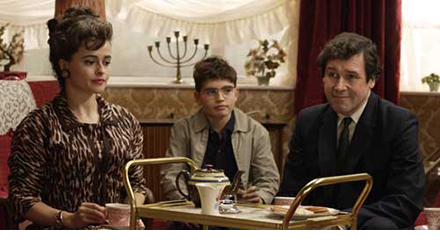 After the art-house buzz for his modern vampire fables “Night Watch” and “Day Watch,” Timur Bekmambetov became a hot property. Atmospheric and spooky, “Night Watch” was riveting entertainment. Providing a welcome twist to the oft-told subject, it contained tangible menace in an epic style as well as a fantastic animated sequence and wonderful set pieces — especially a finely constructed scene which followed the path of a single screw along its journey as it fell from a plane into the bowels of a building. The sequel “Day Watch” ratcheted up the intensity into an apocalyptic showdown replete with a soundtrack of thrash metal and haunting chorale choruses which was still nimble enough to successfully blend tenderness and acute comic touches into the mix.
After the art-house buzz for his modern vampire fables “Night Watch” and “Day Watch,” Timur Bekmambetov became a hot property. Atmospheric and spooky, “Night Watch” was riveting entertainment. Providing a welcome twist to the oft-told subject, it contained tangible menace in an epic style as well as a fantastic animated sequence and wonderful set pieces — especially a finely constructed scene which followed the path of a single screw along its journey as it fell from a plane into the bowels of a building. The sequel “Day Watch” ratcheted up the intensity into an apocalyptic showdown replete with a soundtrack of thrash metal and haunting chorale choruses which was still nimble enough to successfully blend tenderness and acute comic touches into the mix.
In his Hollywood debut, “Wanted,“ Bekmambetov showcases absurdly badass moments but only in fits and starts in a film which feels comparatively restrained and incomplete to his earlier works.
Yet, the opening scenes of the film form the foundation for an interesting social satire of a downtrodden cubicle dweller recruited to become an assassin. There’s a Walter Mitty air to the character of Wesley Allan Gibson (James McAvoy). And the rat race symbolism is unrelenting but effective. However the film veers away from this treatment and spends too much time in training-the-new-guy mode so that it loses this intriguing perspective and lurches towards becoming a pedestrian affair.
Sadly for a talent as compelling as Bekmambetov, “Wanted” doesn’t really let go. It lacks a certain sense of abandon, and even fun. When a film doesn‘t appear to embrace the joke of something as absurd as the “Loom of Fate“ you’d suspect that the director was a misanthrope, if you didn‘t know any better. But both “Night Watch“ and “Day Watch“ revel in humorous moments, even if many of them are black. Perhaps because, unlike “Wanted,“ he co-wrote the screenplays for his two earlier hallmark films, he felt more comfortable finding the gradations of humor amidst the seriousness. But it may be simply that in his first effort in the States working with Universal Pictures he felt impinged. Even this film’s signature visual effect of bullets bent by mind control lacks the relish associated with Bekmambetov’s style.
So if you want a mind-blowing shoot ‘em up, then there’s none better this decade than the criminally unseen “Shoot ’Em Up.” Blessed with the marketing budget of, say, the national Green Party, “Shoot ‘Em Up” snuck into theaters last fall for a mere few weeks before being consigned to cult status: You can’t get more cult than a stupendous Clive Owen, Monica Bellucci, and Paul Giamatti flick that due to its tepid American box office allegedly opened in a single Australian theater. So only a few lucky Melburnians got to see the Michael Davis film which was outlandish, inspired and breakneck. Conversely, while “Wanted” was bestowed with a gargantuan promotional campaign, it is comparably slight and underwhelming.
The attraction for McAvoy to the role of Wesley Allan Gibson is apparent. He seems to revel in the forlorn Gibson, with his exhausted countenance, crumply dress shirts, and vigorously bitten fingernails. But the rest of the characters are completely unblinking, unfunny automatons. They are exceedingly cool but vacant. As the master of the assassins, Morgan Freeman has perfected his chilled persona so expertly that it would be refreshing if we could describe one of his characters as “bat-shit crazy.“ Angelina Jolie traipses across the set likes it‘s a runway. She apparently was paid a great deal to stretch, pout and smirk; not so much for acting. Terence Stamp brought along his startling blue eyes and sonorous voice for an absolute throwaway role which suggests he must have had a spare Bank Holiday weekend.
The ending to “Wanted” is well-crafted nonsense. A major component of the conclusion is that characters have to make dramatic, ultimate choices but because there’s been no development for any role other than McAvoy’s, there’s no context and the decisions feels forced and vacuous. Sadly, for a filmmaker with as much vitality as Bekmambetov, it’s disappointing to meet this finale with a shrug.
Hopefully, with his next venture, reportedly the third installment in the “Watch” trilogy, he will revert to completing a film worthy of his audacious talent. He is capable of making films simultaneously over-the-top and under control. Just maybe not in Hollywood, yet.




 When France rose to their greatest footballing heights at turn of the century, Zinedine Zidane was the talismanic figure of infinite artistry. But a crucial component of those World Cup and European Championship winning squads was an unassuming central midfield stalwart named Emmanuel Petit. Blessed with matinee idol good looks and a blond d’Artagnan ponytail, Petit was a methodical talent who was capable of the moment of magic but mastered the simple rather than the sublime. He perfected the skills of completing short, sensible passes, defending doggedly, and soaking up the excesses of teammates. Petit was indispensable to his nation’s success and replicated this influence for his resurgent club side, Arsenal, as well. In essence, he made the elemental an art form.
When France rose to their greatest footballing heights at turn of the century, Zinedine Zidane was the talismanic figure of infinite artistry. But a crucial component of those World Cup and European Championship winning squads was an unassuming central midfield stalwart named Emmanuel Petit. Blessed with matinee idol good looks and a blond d’Artagnan ponytail, Petit was a methodical talent who was capable of the moment of magic but mastered the simple rather than the sublime. He perfected the skills of completing short, sensible passes, defending doggedly, and soaking up the excesses of teammates. Petit was indispensable to his nation’s success and replicated this influence for his resurgent club side, Arsenal, as well. In essence, he made the elemental an art form.